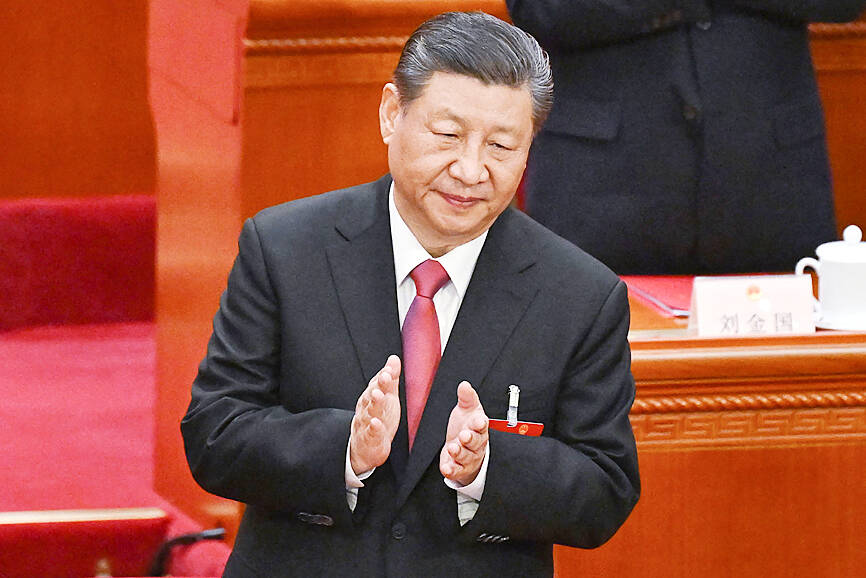China’s leaders yesterday wrapped up a week-long key conclave at which they admitted more was needed to revive a sluggish economy battered by an ailing housing market, poor domestic demand and record-high youth unemployment.
Top officials have been upfront about the myriad challenges China is facing, admitting that a modest 5 percent growth goal would not be easy and that “hidden risks” are dragging the economy down, but they have supplied few details about how they plan to tackle the problems.
Officials have also moved to strengthen powers to deal with threats to their rule and tightened a veil of secrecy around policymaking, scrapping a traditional annual news conference and vowing to include national security provisions in a raft of new laws.

Photo: AFP
Delegates to the National People’s Congress, including Chinese President Xi Jinping (習近平), gathered at Beijing’s Great Hall of the People to rubber-stamp legislation at 3pm as the conclave came to an end.
Among the pieces of legislation approved was a revision to the Organic Law of the State Council, China’s Cabinet, which state media has said would aim to deepen the “leadership” of the Chinese Communist Party over the government.
Delegates also approved the nation’s state budget, and the national economic and social development plan for this year. Only a handful of the body’s almost 3,000 delegates voted against any of the motions.
The tightly choreographed event capped a week of high-level meetings that have been dominated by the economy, which last year posted some of its slowest growth in years.
Ministers on Saturday pledged to do more to boost employment and stabilize the nation’s troubled property market.
“Workers face some challenges and problems in employment, and more effort needs to be made to stabilize employment,” Chinese Minister of Human Resources and Social Security Wang Xiaoping (王曉萍) told a news conference.
Chinese Minister of Housing and Urban-Rural Development Ni Hong (倪虹) said that fixing the property market — which long accounted for about one-quarter of China’s economy — remained “very difficult.”
Despite official pledges of fresh support, analysts say they are yet to see the kinds of big-ticket bailouts the flagging economy needs if it is to rebound.

MORE VISITORS: The Tourism Administration said that it is seeing positive prospects in its efforts to expand the tourism market in North America and Europe Taiwan has been ranked as the cheapest place in the world to travel to this year, based on a list recommended by NerdWallet. The San Francisco-based personal finance company said that Taiwan topped the list of 16 nations it chose for budget travelers because US tourists do not need visas and travelers can easily have a good meal for less than US$10. A bus ride in Taipei costs just under US$0.50, while subway rides start at US$0.60, the firm said, adding that public transportation in Taiwan is easy to navigate. The firm also called Taiwan a “food lover’s paradise,” citing inexpensive breakfast stalls

TRADE: A mandatory declaration of origin for manufactured goods bound for the US is to take effect on May 7 to block China from exploiting Taiwan’s trade channels All products manufactured in Taiwan and exported to the US must include a signed declaration of origin starting on May 7, the Bureau of Foreign Trade announced yesterday. US President Donald Trump on April 2 imposed a 32 percent tariff on imports from Taiwan, but one week later announced a 90-day pause on its implementation. However, a universal 10 percent tariff was immediately applied to most imports from around the world. On April 12, the Trump administration further exempted computers, smartphones and semiconductors from the new tariffs. In response, President William Lai’s (賴清德) administration has introduced a series of countermeasures to support affected

CROSS-STRAIT: The vast majority of Taiwanese support maintaining the ‘status quo,’ while concern is rising about Beijing’s influence operations More than eight out of 10 Taiwanese reject Beijing’s “one country, two systems” framework for cross-strait relations, according to a survey released by the Mainland Affairs Council (MAC) on Thursday. The MAC’s latest quarterly survey found that 84.4 percent of respondents opposed Beijing’s “one country, two systems” formula for handling cross-strait relations — a figure consistent with past polling. Over the past three years, opposition to the framework has remained high, ranging from a low of 83.6 percent in April 2023 to a peak of 89.6 percent in April last year. In the most recent poll, 82.5 percent also rejected China’s

PLUGGING HOLES: The amendments would bring the legislation in line with systems found in other countries such as Japan and the US, Legislator Chen Kuan-ting said Democratic Progressive Party (DPP) Legislator Chen Kuan-ting (陳冠廷) has proposed amending national security legislation amid a spate of espionage cases. Potential gaps in security vetting procedures for personnel with access to sensitive information prompted him to propose the amendments, which would introduce changes to Article 14 of the Classified National Security Information Protection Act (國家機密保護法), Chen said yesterday. The proposal, which aims to enhance interagency vetting procedures and reduce the risk of classified information leaks, would establish a comprehensive security clearance system in Taiwan, he said. The amendment would require character and loyalty checks for civil servants and intelligence personnel prior to